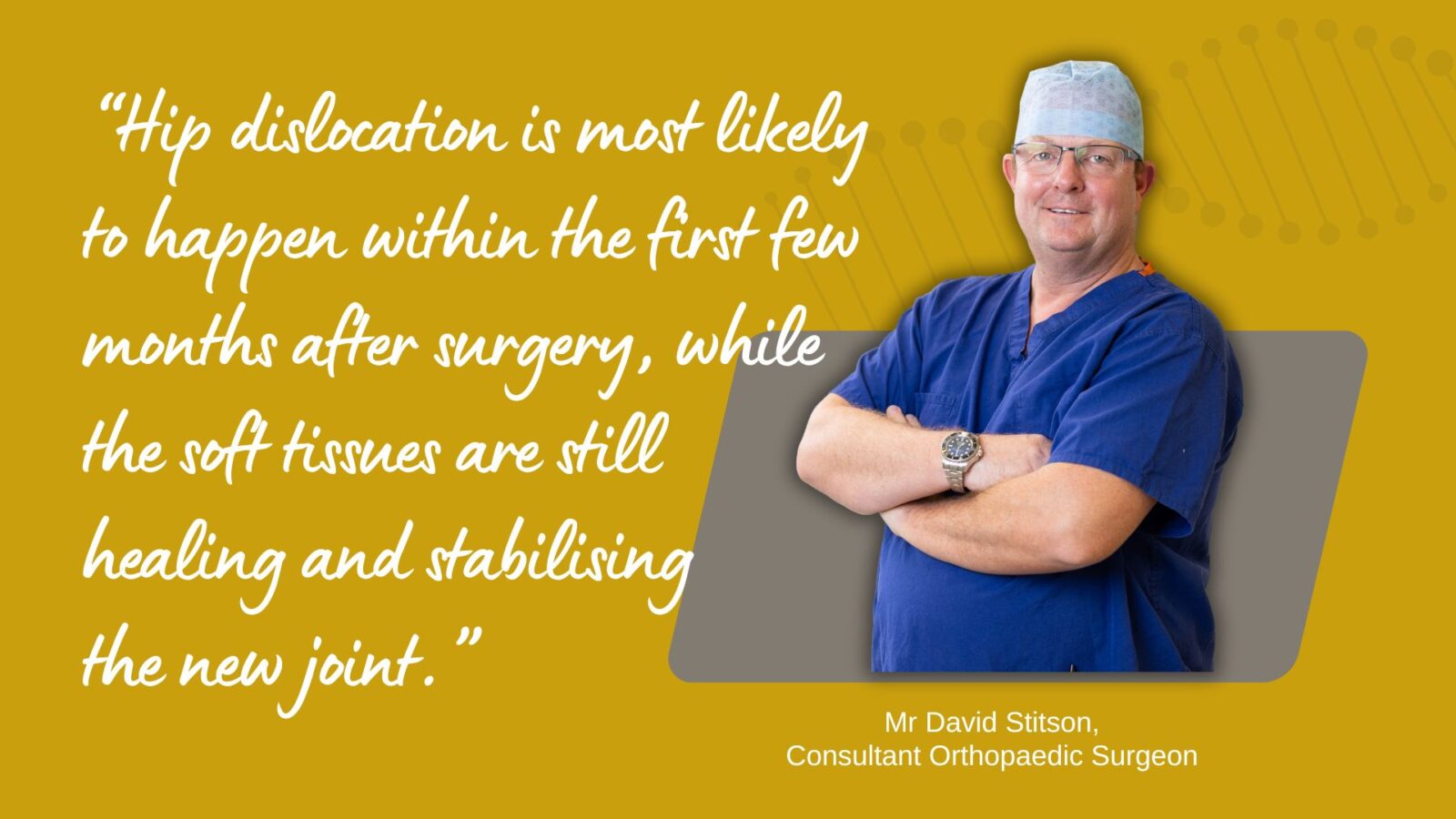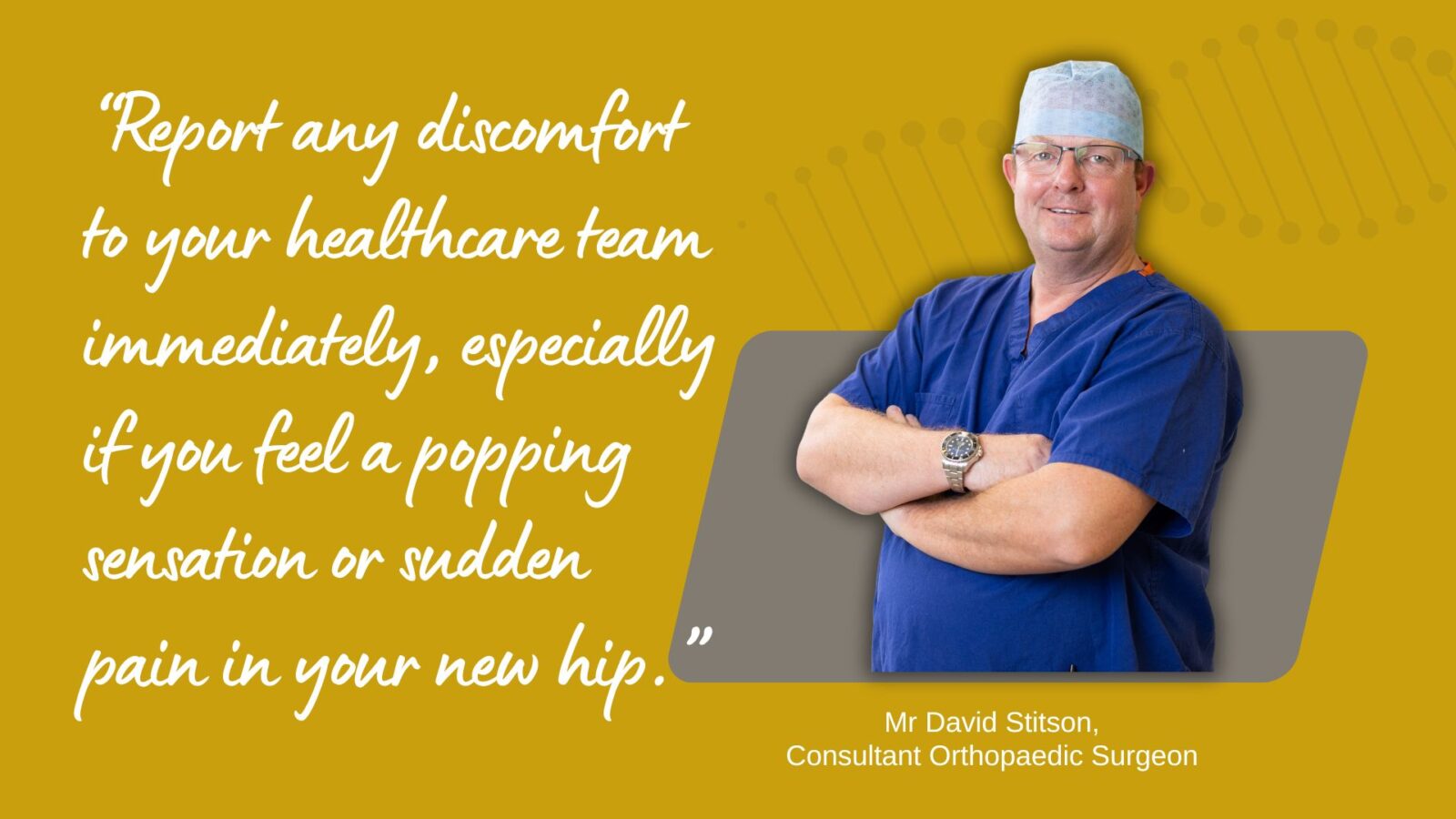Hip replacement surgery is a highly effective solution for individuals suffering from severe hip pain and mobility issues, often caused by arthritis or injury. While most patients experience significant improvement in their quality of life following the procedure, some report complications during recovery.
Contents
ToggleWhy Is a Hip Replacement Recommended?
A hip replacement is typically recommended when the hip joint is damaged beyond repair, most commonly due to osteoarthritis, rheumatoid arthritis or traumatic injury. The procedure involves replacing the damaged hip joint with an artificial implant, providing pain relief and restoring mobility. Common signs that you might need a hip replacement include:
- Persistent hip pain that interferes with daily activities.
- Limited mobility or difficulty walking.
- Hip stiffness and discomfort, even when resting.
6 Common Hip Replacement Complications
Although hip replacement is generally safe, complications can arise. Understanding these potential risks can help patients be prepared and know what to watch out for during recovery. Some of the common complications include:
1. Hip Dislocation
The ball of the artificial joint can pop out of its socket, especially in the first few months post-surgery. This is most likely to occur when the hip is in certain positions, such as when bending too far or crossing the legs.
2. Infection
Infections can occur at the incision site or deep around the new hip joint. This can range from mild to severe, potentially requiring further surgery.
3. Blood Clots
After surgery, blood clots may form in the leg veins (deep vein thrombosis), which can be dangerous if they travel to the lungs. Blood thinners are prescribed in the post-op period to help reduce the risk.
4. Leg Length Discrepancy
In some cases, one leg may end up slightly longer or shorter than the other after surgery, causing discomfort or gait issues.
5. Nerve or Blood Vessel Damage
The nerves and blood vessels around the hip can occasionally be injured during surgery, leading to numbness, weakness or abnormal blood flow.
6. Loosening of the Implant
Over time, the artificial joint may loosen or wear down, especially in younger, more active patients. This could result in pain or instability.
As you can see, one of the reported problems after hip surgery is hip dislocation. The risk of this is approximately 1 to 2% across the lifetime of the joint.
This complication occurs when the ball of the new hip joint is displaced from its socket, leading to pain, reduced mobility and urgent need for relocation and, on occasion, the need for further treatment or surgery.
Hip dislocation is most likely to happen within the first few months after surgery, while the soft tissues are still healing and stabilising the new joint.
Why Does Hip Dislocation Occur?
Several factors can increase the risk of hip dislocation, including:
- Type of Hip Implant and Surgical Approach: Some designs may have a slightly higher risk of dislocation, depending on the materials used and the surgical approach.
- Patient Activity: Sudden movements, improper sitting or bending postures and excessive physical activity can place undue stress on the new hip joint, increasing the chances of dislocation.
- Inadequate Muscle Strength: Weakness in the muscles around the hip joint, particularly those affected by surgery, can make it difficult to keep the joint in place.
- Non-Adherence to Post-Op Guidelines: Following the surgeon’s guidance on movement restrictions, exercises and activities after surgery is essential to reduce the risk of complications like dislocation.
Preventing and Managing Hip Dislocation
To reduce the likelihood of a hip dislocation, patients should:
- Follow movement precautions carefully, particularly when bending, sitting, or getting out of bed.
- Strengthen the muscles surrounding the hip with post-surgical physiotherapy, which helps stabilise the joint.
- Use assistive devices like a walker or crutches, if recommended, to reduce stress on the new hip.
- Report any discomfort to their healthcare team immediately, especially if they feel a popping sensation or sudden pain in the hip.
In cases where a hip dislocation occurs, treatment often involves a procedure called ‘a closed reduction’, where the surgeon manually places the joint back into the socket. In some instances, repeat dislocations may require hip revision surgery to correct any underlying issue.
It is essential to discuss all your options with Mr Stitson, who can guide you through the treatment process and advise on how you can achieve the best possible outcome.
Critical Hip Exercises to Aid Recovery
After hip replacement surgery, there are several exercises that can help with recovery, including:
Walking
Walking is a great way to help your hip recover, especially when done with the help of crutches, a stick, or a walker. Mr Stitson or the therapist will advise you on how much weight to put on your leg.
Low-impact exercise
Low-impact exercises like stationary cycling, swimming and using an elliptical trainer or treadmill can help with cardiovascular fitness.
Physiotherapy
Your physiotherapist may recommend exercises like step-ups, heel raises, heel slides, ankle circles, single-leg stands and bridges.
Bed exercises – You can try these exercises while lying on your back:
- Pointing your toes up and away, then back up again, 30 times with each foot
- Sliding your foot up and down while bending your knee, 10 times with each foot
- Sliding your operated leg out to the side and back, 10 times
Hip abductions and glute raises – After three months, you can try these exercises to increase your endurance.
You should avoid high-impact activities like running, jumping or lifting heavy weights, as these can damage the replacement. Mr Stitson will clear you to return to sports at about 12 weeks after surgery.
Complications That May Require Hip Revision Surgery
In some cases, complications after a hip replacement are severe enough to require a second surgery, known as hip revision surgery. These complications may include:
- Implant Failure
Sometimes, the artificial joint can fail due to wear and tear, loosening or breakage.
- Chronic Infection
Infections that don’t respond to antibiotics or reoccur may require revision surgery to remove and replace the prosthesis.
- Recurrent Dislocation
If dislocation happens multiple times, revision surgery might be necessary to correct the problem and ensure stability.
Long-Term Complications of a Hip Replacement
While most hip replacements last 15–20 years or longer, some patients may experience long-term complications:
- Implant Wear and Tear
Over time, the materials used in the hip replacement can wear down. This can cause the joint to become loose or uncomfortable.
- Osteolysis
A long-term issue where tiny particles from the implant can be absorbed by the body, causing bone loss around the implant and potentially leading to the implant loosening and instability. - Periprosthetic Fractures
As the bone weakens over time, fractures can occur around the implant, particularly after a fall or other injury.
Q: How long does a hip replacement last?
A: Most hip replacements last between 15–20 years, but factors such as activity level, weight, and implant type can affect longevity.
Q: What can I do to reduce the risk of complications after hip surgery?
A: Following Mr Stitson’s post-operative instructions is critical. Avoiding high-impact activities, maintaining a healthy weight and doing prescribed physiotherapy exercises will help.
Q: When should I contact my surgeon after hip replacement?
A: Contact Mr Stitson if you experience persistent pain, swelling, redness, or fever or if you notice changes in the appearance of the surgical site.
A specialist in hip replacement surgery
David Stitson, a specialist in hip replacement surgery at Nuffield Hospital in Plymouth, will expertly guide you through your treatment journey, ensuring you receive the best possible care. With extensive experience and membership of medical societies such as the BMA, BOA, CSOS, RCS, and GMC, Mr Stitson offers comprehensive care from consultation to recovery. His deep commitment to patient outcomes ensures you are in safe hands throughout your treatment.About Hip Surgery
Hip replacement surgery replaces the worn-out painful and stiff hip joint with a new prosthetic joint. This procedure is normally performed under spinal anaesthesia and is commonly followed by a night or two in the hospital. Day-case hip replacement surgery may be an appropriate option for you.

About Mr Stitson
David Stitson is a Plymouth-based Consultant Trauma and Orthopaedic Surgeon. Trained both in the UK and internationally, he has worked in medicine for more than 20 years for the NHS, for the Royal Air Force and in private practice. Mr Stitson operates privately at the Nuffield Health Hospital, Plymouth.

The Nuffield Plymouth CQC Rating
The Nuffield Hospital has a history that spans over half a century and has built a reputation for high standards of care, professionalism and expertise in delivering health services. They aim for continuous quality improvement in everything they do.
Active Quality and Governance programmes are in place at the Nuffield Hospital Plymouth. As part of this, the hospital is inspected by independent healthcare regulators to ensure it meets the fundamental standards of quality and safety as determined by the regulating body (CQC).
In the most recent inspection, Plymouth Nuffield Hospital was rated as ‘Good’ overall, however, the surgical element of the inspection was rated as ‘Outstanding’. The hospital was referred to as:
“Outstanding in effective and caring, and
Good in safe, responsive and well-led.”






